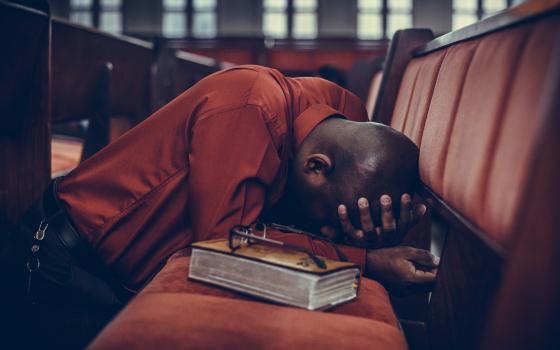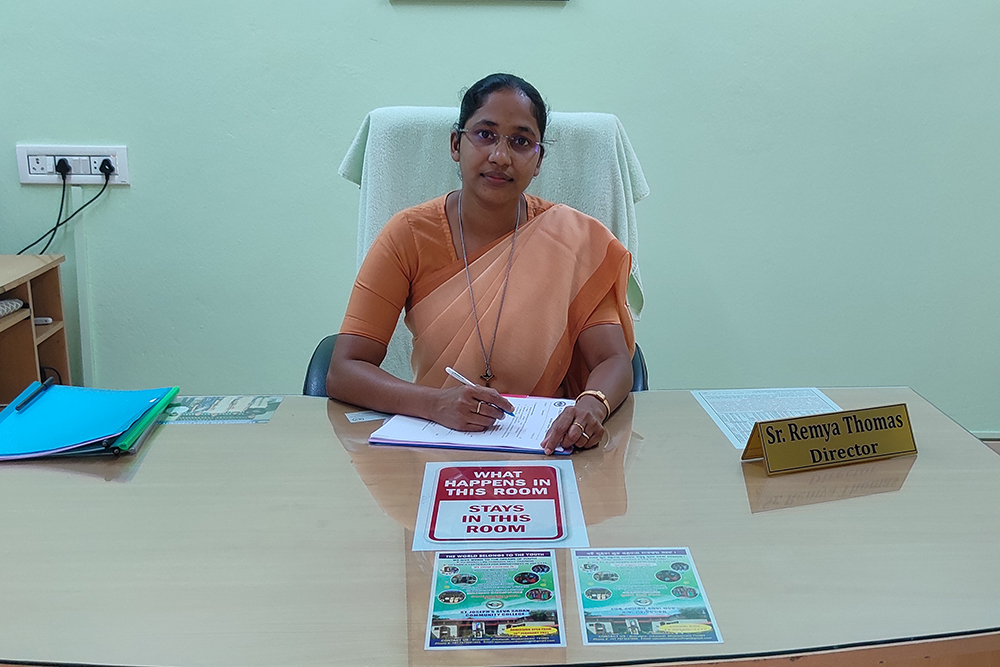
Sr. Remya Thomas, a member of the Sisters of St. Joseph of Annecy, in her office at St. Joseph Community College in Bhubaneswar, capital of the eastern Indian state of Odisha, where she is the director. (Courtesy of Remya Thomas)
Sr. Remya Thomas has become a harbinger of hope for poor jobless youth in Odisha state in eastern India. St. Joseph's Community College in the state capital of Bhubaneswar, which is managed by her congregation, the Sisters of St. Joseph of Annecy, finds them jobs after imparting skill training.
"I am grateful to Sister Remya for giving me this wonderful opportunity," said Gloria Baliar Singh, who works in a private hotel chain in Bengaluru, capital of the southwestern Indian state of Karnataka, after a three-month course on accounting at the community college.
The 24-year-old told Global Sisters Report that the college had conducted some crash courses on basic computer application, sales, marketing, and English language and etiquette to enhance her job eligibility.
After the pandemic lockdown in 2020 and 2021, the hotel chain transferred her to their location in Mangaluru, a port town in Karnataka.
Similarly, Mases Nanda thanks Thomas for his job in the international airport at Hyderabad, capital of Telangana, Odisha's western neighboring state. He was desperately looking for a job when he joined Thomas' community college, which provided him a course on business management, spoken English and computer skills.
Thomas, who has a master's degree in social work and a bachelor's degree in law, took over as the director of the college in 2018. The 37-year-old native of the southwestern Indian state of Kerala shared with GSR her challenges as a missionary in Odisha.
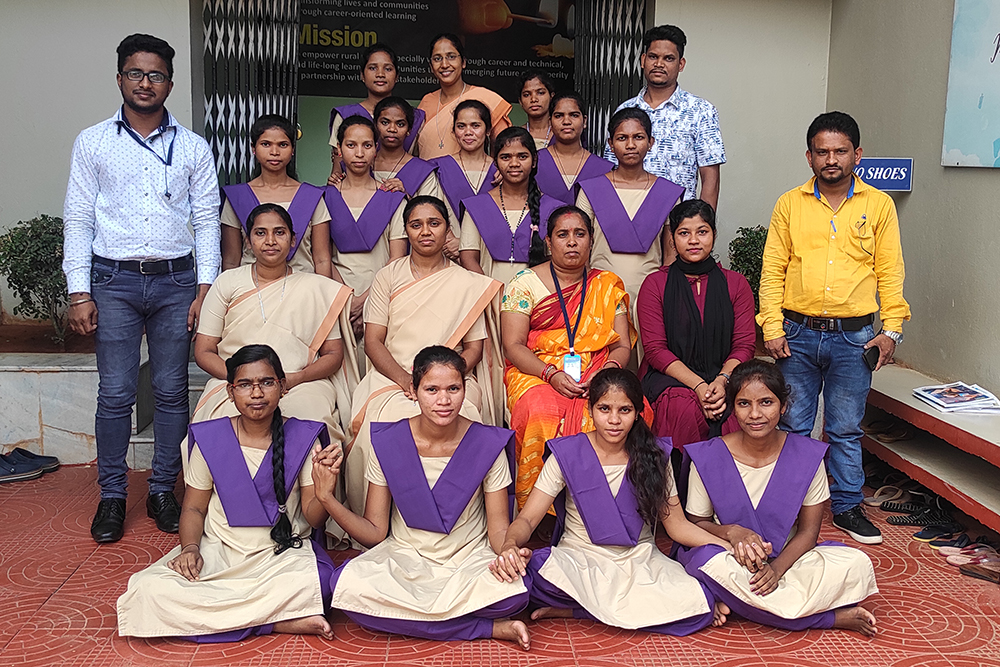
Sr. Remya Thomas, back row center, with some of her students at St. Joseph Community College in Bhubaneswar, capital of the eastern Indian state of Odisha (Courtesy of Remya Thomas)
GSR: You were engaged in empowering women in Odisha's remote villages before you took up this responsibility. Why did you join the community college?
Thomas: Yes, I was doing quite well in my work among poor and illiterate women in the remote villages of Kandhamal district, but my superiors asked me to take up this job as they found me suitable for the post.
Why did your congregation start this college?
My congregation started this in 2008 to provide skill training to young people from shanties in cities and remote villages in Odisha, as unemployment was rampant among them. Our sisters managed the college until 2012 with courses in tailoring and other skills. In 2013, they handed it over to the Salesian priests to provide short-term skill training and job placement. In 2018, they returned the college to our congregation, and I was asked to head it.
Advertisement
Do you mean things were not as rosy as they look today?
You see, there is always a scope for improvement, but that does not mean those who served the institution earlier had done nothing. They did what they could, and I got an opportunity to build upon the foundation they laid.
When I took over, the biggest challenge was to find funds to sustain the college and to keep the momentum going. But I trusted in the providence of God and moved on.
Now, our college offers training on industrial machine operation, fashion design, computer skills, hotel management, nursing aid, and communicative English for school and college dropouts from economically poor backgrounds. On successful completion of the courses, the students are helped get instant placement through our network of employers.
We also offer three-month certificate courses for schoolchildren during summer vacation, such as communicative English, computer application, creative writing, crafts and arts. Now, 10 full-time teachers work in the college. We have 45 resident students and 65 day scholars.
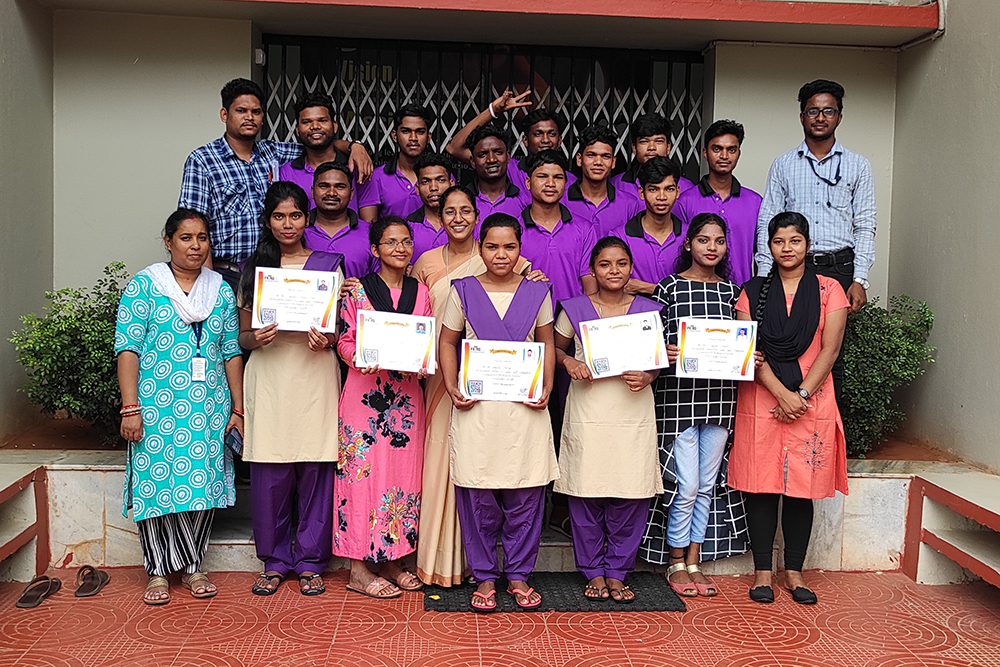
Sr. Remya Thomas, tan sari with glasses, poses with St. Joseph Community College students holding their certificates showing they have successfully completed their courses. (Courtesy of Remya Thomas)
How many students have you placed so far?
We have trained more than 4,100 students and, among them, more than 85% are employed. In some cases, female students find difficulty to continue with their jobs after marriage or other family-related issues.
What are procedures for their admission and placements?
We choose our students based on their needs. Most students come through known contacts such as former students, priests, nuns and others associated with us. This ensures genuine people get the benefit of our free training.
When it comes to placement, once a student successfully completes the training, we recommend him or her to a network of employers associated with us. Sometimes, they come to our campus and directly recruit them.
I also visit every candidate's workplace at least in the first year of placement. When it comes to girls, I take them to their employers and keep in touch with them. I also try to meet our former students at least once a year. It is also quite satisfying to see them lead dignified lives with jobs that fetch them a monthly income between 12,000 and 20,000 rupees [$150 to $250].
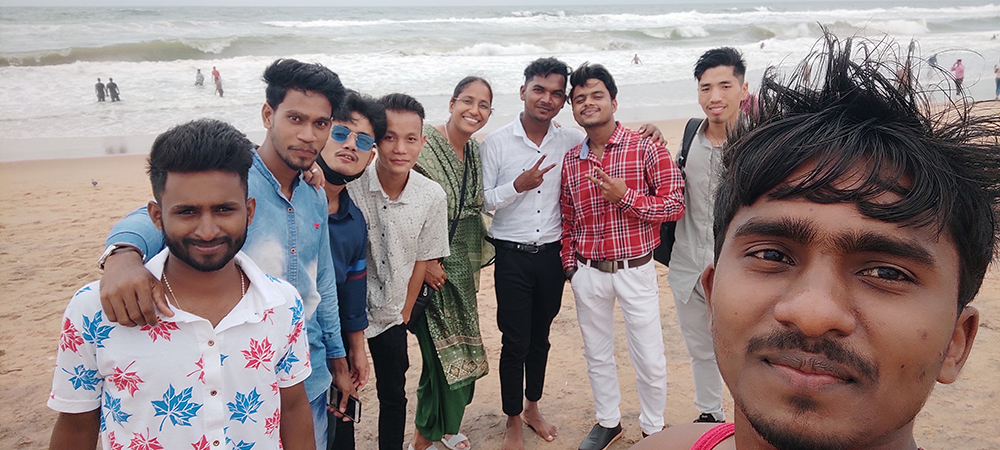
Sr. Remya Thomas, center, on a picnic with St. Joseph Community College students (Courtesy of Remya Thomas)
Could you elaborate on your earlier work among women of Kandhamal?
I was working to empower illiterate rural women who were treated like objects with no rights or respect. Gender discrimination was so deep-rooted in society that people always preferred boys and considered girls a burden.
I worked in 25 villages, setting up self-help groups for women. Although women were not respected, they were the backbone of the family because generally, men were into alcoholism, drugs and other negative activities. Some men have multiple relations, but nobody bothers about it. It is true that some women too have multiple partners. We tried to promote education among the children and inculcate self-respect among women through livelihood programs.
Did you ever face any threat for being a missionary?
Yes. Once, I got a rape threat from a local gang leader who knew my movements in the villages. When he threatened to rape me, my sisters were afraid and took me to Bhubaneswar, where I stayed for a week. My sisters were worried because to reach one of my mission stations, I had to travel by bus for 150 kilometers [94 miles]. I used to board the only bus at 3 a.m. and returned in it at midnight.
But I soon realized that there was no pointing in hiding and returned to my workplace a week later. I was sure hiding would not stop the threat. It would happen if it was God's plan. I strongly believe that nothing happens in my life without the knowledge of God. I continued with my work until my transfer, and nobody disturbed me.
What motivated you to become a nun?
It is still a mystery. I was the only, pampered child of my parents. My parents and relatives did not believe that I would become a nun even though I joined the congregation.
During the postulancy in 2003, my father reached the convent to take me back home. I intensely prayed to God for a sign to decide whether I should continue or quit. As I was teaching in nursery school, I said if I would get a red rose from any of my students, it would be considered a sign from God to stay in my vocation. A little boy came to me with a red rose, and it convinced me that my vocation is from God and he would take care of me. God protected me in all difficult situations in my life.
What is your message to aspiring missionaries and those serving in difficult missions?
When we do God's work, he will be our guard. He will not let you down, whatever the difficulties. When I joined the community college, it was literarily a hand-to-mouth existence. But providence helped me so much so that different people offered help, and therefore, I am able to help so many unemployed youths.






